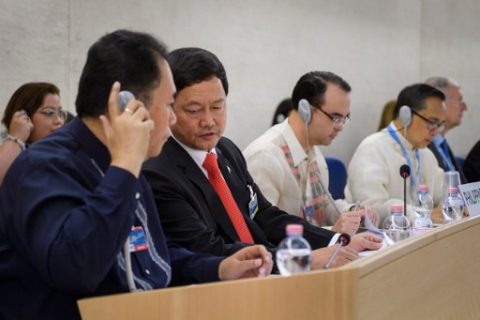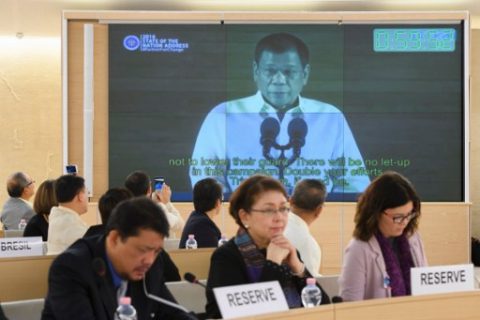
The Philippines’ record is reviewed by the UN human rights council for the first time since the inauguration of President Rodrigo Duterte. / AFP PHOTO / Fabrice COFFRINI
A high-level Philippine delegation presented the country’s human rights situation during the Universal Periodic Review (UPR) before the United Nations Human Rights Council (UNHRC) in Geneva, Switzerland, and defended President Rodrigo Duterte’s drug war.
The meeting began with Filipino Senator Alan Cayetano, denouncing what he called a campaign by rights advocates and the media to distort perceptions of the government’s anti-drug effort.
“There is no new wave of killings in the Philippines,” Cayetano told the council.
He said the government’s enemies were using “a political tactic” of manipulating figures on extrajudicial killings to undermine the fight against a scourge that has poisoned Filipino society.
Cayetano also showed a video clip of Duterte vowing to put “drug lords … below (the) ground”, an unusual move at the UN council where governments do not typically publicize death threats by their heads of state.
Canada called on Manila to “end extrajudicial killings, enforced disappearances, illegal arrests and detention, torture and harassment.”
Delegations from Australia, Brazil, France, Germany and Ghana, among others, made identical calls.

The Philippines’ record is reviewed by the UN human rights council for the first time since the inauguration of President Rodrigo Duterte, who has been accused of massive violations in his so-called drug war. / AFP PHOTO / Fabrice COFFRINI
China defends PHL drug war
China however offered support to the Philippine president, declaring drugs “the public enemy of mankind.”
Deputy executive secretary for legal affairs Menardo Guevarra, Presidential Human Rights Committee Undersecretary Severo Catura, and Senator Cayetano led the Philippine delegation to Geneva.
The other members of the delegation are the following: Ephraim Cortez of the National Union of People’s Lawyers (NUPL), Jigs Clamor (KARAPATAN), Sharon Cabusao-Silva (Gabriela), Bro. Jun Santiago (Rise Up), Nardy Sabino (Promotion of Church People’s Response), Jerrome Baris (UCCP), Jojo Guan (Center for Women’s Resources), Pia Malayao (KATRIBU) and Beverly Longid (Rural Missionaries of the Philippines-Northern Mindanao Region).
PHL welcomes UN review
Cayetano said that the session was an “opportunity to highlight the country’s significant and sustained achievements in upholding, promoting and protecting the human rights of every Filipino through a whole-of-government approach and in partnership with all stakeholders.”
The senator also said that the Philippines is a strong supporter of the periodic review, which the country sees as a useful tool for making real changes on the ground.
“The Philippines attaches utmost importance to the work of the Human Rights Council, especially as it contributes to building the capacity of States to promote and protect human rights and fundamental freedoms,” Cayetano said.
Commission on Human Rights (CHR) chairman Chito Gascon also flew to Geneva on Saturday to monitor the universal periodic review, along with two commissioners.
“This is not a condemnatory approach. In other words, the different government representatives will sit with their peers, the representatives of the Philippine government, and the purpose is to have a dialogue about the human rights situation,” he said.
Gascon said that the Philippine government would have a chance to respond at the end of the review, and will finalize their report.
This report, which will have a listing of the observations and recommendations on the human rights situation that that the Philippine government would need to act on, would then have to be approved by the human rights council.
-Duterte supporters rally outside UN
A group of roughly 50 pro-Duterte supporters braved a light rain outside the UN earlier on Monday, hoisting placards proclaiming “Duterte is not a mass murderer.”
Foreign governments and UN officials are free to criticise the president, protest organiser, Dexi Jimenez told AFP, but added that they need to understand “the war on drugs has gained (him) excellent ratings” in public opinion polls.
Duterte was elected largely on a law-and-order platform in which he promised to eradicate illegal drugs and criminality.
Countries across the world put the Philippines on notice over its drug war on Monday.
Diplomats condemned the reported surge of deaths during so-called anti-drug operations.
The Philippines was facing its regular review at the Geneva-based UN human rights council, where each country’s record is scrutinized every four years.
(with a report from Ben Simon of Agence France Presse)







